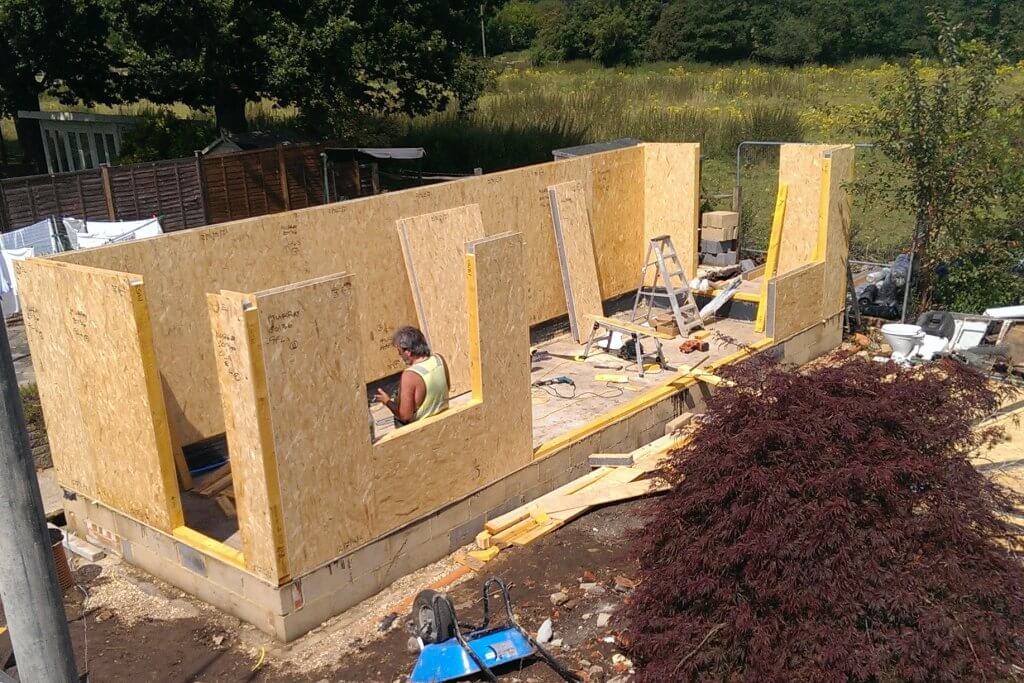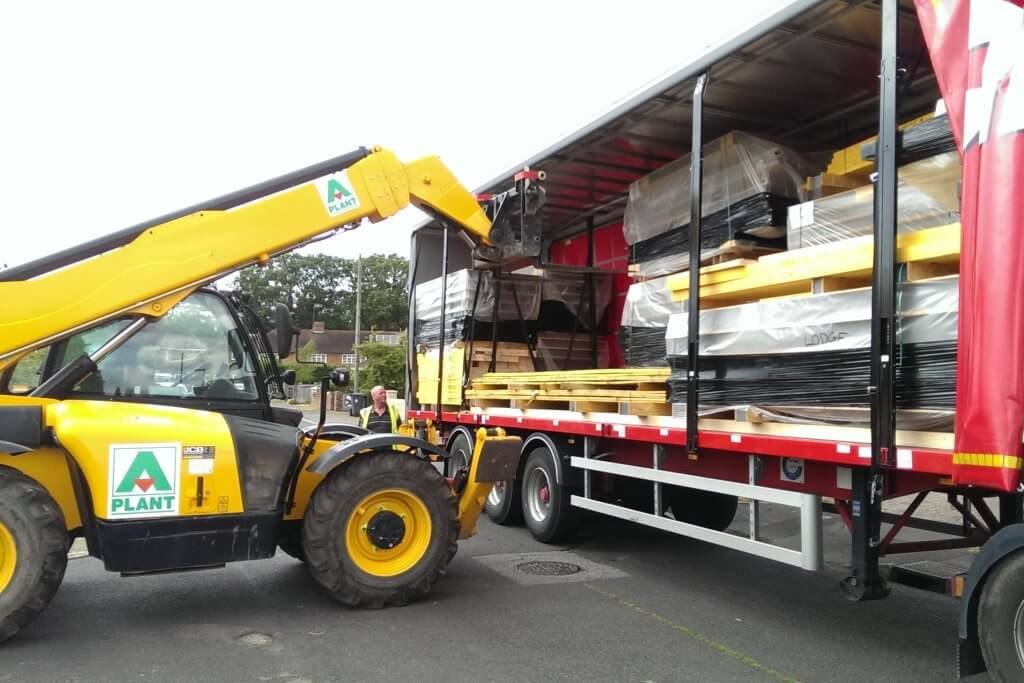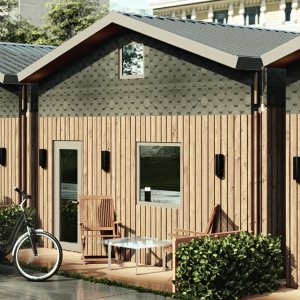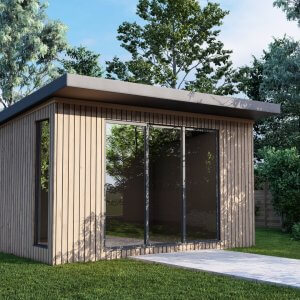What are SIPs?
Structural insulated panels (SIPs) have been used within the construction industry in more recent times for both residential and commercial builds. They provide a high-performance building system which is extremely strong, relatively low cost and energy-efficient. SIPs consist of an insulating foam core sandwiched between two structural facings, most commonly Oriented Strand Board (OSB). This type of engineered wood is similar to particle board, a mixture of wood shavings and adhesive, compressed together to form a strong but lightweight board. The OSB is bonded to the insulating core, without any gaps between. Therefore, buildings made from SIPs can expect less air leakage and fewer drafts, reduced penetrations for noise, more superior insulation properties, leading to lower energy bills and a significantly more comfortable and ambient indoor environment. In this article, we will explore why this is the case, and show how our very own Bio-SIPs have been innovatively developed, putting Qube Buildings at the cutting edge of modular construction.

Structural insulated panels
Traditional panels are usually either 142mm or 172mm thick, with a standard width of 1220mm. SIPs can however, be manufactured to measure varying sizes up to 7.5 meters in length, depending on the requirements of the project.
Structural insulated panels are manufactured precisely in the factory away from site, and can be integrated partially or completely into the design and construction of most building projects. This allows architects and their clients the flexibility and creative freedom to create aesthetically pleasing builds whilst better supporting our environment. The off-site manufacturing of the panels contributes to a reduction of waste, which helps to minimize transportation energy and costs. Each panel is produced to the required size, and can then be stacked together ready for shipment. Once the SIPs arrive on site, installation is straightforward and the result is a building system which can be erected in a very small time frame, reducing construction (i.e scaffolding,) labour and materials costs, compared to buildings which do not incorporate SIPs. A BASF time-motion study found that SIP panels reduce onsite labor requirements by 55%.
Traditionally, Structural insulated panels are fabricated using sustainably sourced timber, such as OSB making them desirable to both the construction industry and the consumer. One of the many benefits of choosing SIPs as part of your build, is that significantly less timber is required when compared to other designs using timber frames. As a result SIPs offer economically sustainable and more eco-friendly solutions within the construction industry.
Another benefit to using SIPs is the high strength to weight ratio they offer. The lightweight panels allow for large sections of your building to be fitted quickly and easily, speeding up the time required on site for erection.
Structural Insulated Panels can contribute up to 50% better energy-efficiency
Once installation is complete, SIPs deliver superior insulating properties and airtightness, contributing to reduced energy costs over the lifetime of the building. Incorporating SIPs into the design of your building can contribute up to 50% better energy-efficiency, when compared to traditional timber framing. A SIP building or construction will have decreased thermal bridging, and offers excellent airtightness, making SIPs highly energy-efficient and therefore contributing toward reducing CO2 levels as we move into the future.

Bio-SIPs for a better future
Here at Qube, we are focused on using sustainably sourced, high performance materials. Our engineers have developed our registered Bio-SIPs ready to launch to market. Bio-SIPs are set to offer advanced performance and far superior insulating properties, in comparison to traditional SIPs available today. Decades of research and engineering have contributed to producing the superior insulating foam core we use in our Bio-SIP’s today, and we are passionate about sustainability, ensuring our Bio-SIPs are 100% recyclable or can be repurposed.
What are the benefits of Bio-SIP systems?
The Bio-SIP’s foam core is extremely lightweight and delivers superior thermal performance, developed using 100% recycled PET (polyethylene terephthalate) as the raw material base. This innovative and clever material delivers significantly less CO2 emissions compared to traditional SIP insulation. This contributes to greater savings across its life span, helping to better protect the environment long term, as well as immediately benefiting the client with cost savings on heating. For this reason, Qube’s Bio-SIP’s are the smarter choice for use in the design and construction of your next project.
Bio-SIP’s ensure your space stays warm and comfortable throughout the year, even in the coldest winter months., Requiring only minimal heating in the winter and cooling in the summer to achieve and maintain an optimal temperature all year round. In fact, similar technology is used in the commercial refrigeration industry, which makes use of the same sophisticated engineering and materials we utilize in our Bio-SIP’s. The internal foam core structure works by keeping cold and warm air separate, preventing thermal transfer or heat loss from occurring. This is achieved by tiny air-filled pockets known as closed-cells, created during the manufacture of the foam, which prevent thermal exchange from happening.

The power of plastic
The PET foam core used in our composite panels is derived from plastic in the form of recycled drinks bottles, which would otherwise be headed for landfill. After collection, the PET (polyethylene terephthalate) plastic bottles are sorted and crushed down to form flakes. This is then followed by a granulation process and lastly, extrusion foaming. This newly formed material is much stronger compared to other types of foam, which is less able to withstand weight- loading and can weaken. It is also more rigid and importantly, water resistant, owing to its plastic properties. This combination of factors alone, means the recycled plastic core we use in our Bio-SIP systems is extremely well suited for use for spaces both big and small, and by recycling material in this way, a significant amount of plastic is prevented from ending up in landfill.
The insulation used in our Bio-SIP system sits between two exterior boards, which are bonded to the core. These are made using natural, organic materials such as flax or hemp fibres, which are then mixed with a bio resin to form a strong and watertight exterior, whilst contributing very little weight to the overall product.
Qube Buildings are passionate about promoting the many benefits of our Bio-SIP systems and believe we can all play our part in contributing towards a cleaner, greener future. If you want to find out more about our next generation Bio-SIPs and modular buildings, visit our website www.qubebuildings.co.uk and get in touch. Our friendly team is more than happy to help answer your questions and queries.



